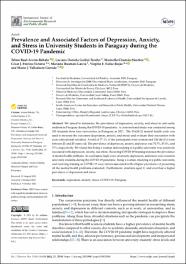Prevalence and Associated Factors of Depression, Anxiety, and Stress in University Students in Paraguay during the COVID-19 Pandemic

View/
Download
(application/pdf: 395.2Kb)
(application/pdf: 395.2Kb)
Date
2022-10-09Author(s)
Aveiro-Róbalo, Telmo Raul
Garlisi-Torales, Luciana Daniela
Chumán-Sánchez, Marisella
Pereira-Victorio, César J.
Huaman-Garcia, Mariana
Failoc-Rojas, Virgilio E.
Valladares-Garrido, Mario J.
Metadata
Show full item recordAbstract
We aimed to determine the prevalence of depression, anxiety, and stress in university students in Paraguay during the COVID-19 pandemic. A cross-sectional study was conducted among 293 students from four universities in Paraguay in 2021. The DASS-21 mental health scale was used to measure the outcomes (depression, anxiety, and stress) and evaluate their association with socio-educational variables. A total of 77.1% of the participants were women and 136 (46.4%) were between 21 and 25 years old. The prevalence of depression, anxiety, and stress was 74.7%, 87.4%, and 57%, respectively. We found that being a woman and studying at a public university was positively associated with depression, anxiety, and stress. Receiving COVID-19 training increases the prevalence of mental health problems. In conclusion, high levels of anxiety, depression, and stress were found in university students during the COVID-19 pandemic. Being a woman, studying at a public university, and receiving training on COVID-19 were factors associated with a higher prevalence of presenting all the mental health problems evaluated. Furthermore, students aged 31 and over had a higher prevalence of depression and stress.
Collections
- SCOPUS [380]

